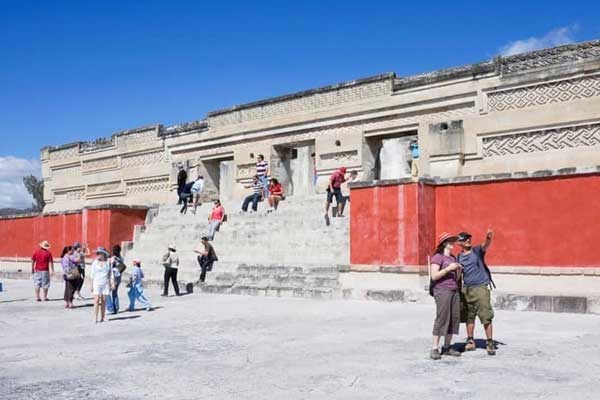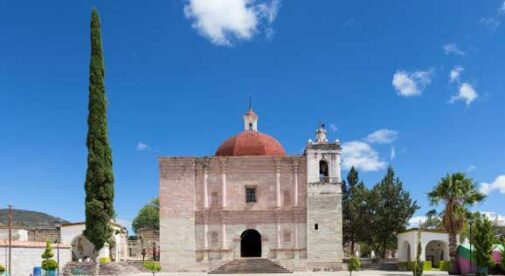Julie May Locke, a 68-year-old Brooklyn native, never planned on living in the small, south-central Mexican village of Mitla, which is about a 30-minute drive from Oaxaca City. She had recently retired, and she needed a change—but this hadn’t been on her radar until she realized exactly how priced out of life on the east coast of the US she really was.
“I couldn’t afford to live in New York or stay in D.C., where my daughter, Brook Lynn, and I had been living. I couldn’t afford anything!” she says. “So my daughter, who is bilingual in Spanish, went on a nine-month excursion, traveled all over the place, and she decided that Mexico would be a good place for us. We came to Mitla in 2019, shortly after I retired, and we didn’t look back.
[question_evergreen]
“There was something about Mitla that seemed very cool. Everyone is so accepting. They greet us with buenos días in the morning and ask how we are doing or where we’re going. People don’t want to engage in the U.S., but they are so friendly here.”

To make a bit of extra money, the mother-daughter duo decided to run a small Airbnb guesthouse from their residence. “It was very simple to set this business up,” Julie says. “No permits were required. We just did it.
“We found this beautiful house to rent close to the river, and it’s like a castle—but one I can afford. We call it Casa Buenas Vibras (the House of Good Vibes). It has four bedrooms, three bathrooms, a Jacuzzi tub, a big kitchen, a garden, and delightful terraces that look over the town,” she says.
[mexico_signup]
“In the morning, we might serve oatmeal or granola, fresh fruits, or maybe some pastries, but we’re not really a bed and breakfast,” she says. “I live in one room and rent the remainder of the rooms out, and everyone is comfortable.”
Mitla is home to some well-preserved Zapotec ruins; it’s the second most important archeological site in the state of Oaxaca after Monte Albán. Intricate mosaics and geometric designs cover entire walls of the sprawling complex. Mitla is a designated pueblo mágico (magical town) due to this archeological site. The village is compact and cute, and it’s a popular destination for tourists, which helps keep the rooms at Julie’s place full.

Julie’s rent, which is currently $700, doesn’t include any utilities, but those aren’t a major expense in this part of Mexico. Mitla’s 4,855-foot elevation keeps the climate comfortable year-round, with most days in the mid-70s F and evenings in the 50s F, so there’s little need for heating or air conditioning. Julie says that their electricity averages just $7.50 per month.
“If we don’t really do anything and we’re being frugal, we’ll spend less than $1,000 per month,” she says. “Even when we’re out and about, going into Oaxaca to shop and eat, we’re still spending less than $1,500.”
This low cost of living has allowed Julie and her daughter to make plans they never could have dreamed of back in New York or D.C. “Mitla is so affordable that we bought land and are building a pool with a swim-up bar, Jacuzzi, and entertainment venue,” she says.
Buying this land will also let them give back to their new community. Mitla, as well as other villages in Oaxaca State, practices tequio. The tequio concept, which dates back to the time before the Spaniards came, means that everyone living there gives back to the community.
“People will pick up trash or cut bamboo, whatever they can do, as a way of contributing to the town,” Julie says, “There are some formal duties that depend on the village where you live or if you’re a landowner, but there are also voluntary things that you can do. We’ll be offering free English classes to the locals as part of our tequio, and building a communal kitchen that someone can use or rent out.”
Though Mitla does have a doctor, it’s best to go into Oaxaca, where there is good quality healthcare. Julie says, “My daughter was hospitalized there for kidney stones. She spent the night in the hospital, and with IVs and meds—everything—it cost about $400.” Julie also goes into Oaxaca for dental care.
It’s easy to get to the city, even though Julie doesn’t own a car or even a bicycle to get around. “I’ll take a collectivo—a shared taxi—and pay about $10 to go into Oaxaca. If I just need to go to the market or do something in Mitla and I don’t want to walk, I’ll take a moto-taxi [a three-wheeled motorbike with a partially enclosed sitting area for two passengers] for 50 cents.”
About 20 expats live in Mitla, though they don’t interact much with each other, Julie says, preferring to be integrated into the community. Julie says that the local restaurant selection is modest in her village. “We decided that we could live in Mitla only if we could go to Oaxaca and eat out. So we go into Oaxaca every couple of months to get supplies for the Airbnb and buy steak and seafood, since we can’t get that in the village. We can get good wine at Sam’s Club. While we’re there, we’ll eat at Casa Taviche, which is our favorite restaurant. The menu changes every day, and we always leave room for dessert. Dinner for two, excluding beer, costs about $15.”
Julie found exactly what she was looking for in Mitla. “I was looking for a life that was wholesome,” she says. “I like to play in the kitchen, which I never had time for before. Even if it’s just reading, I have time to do that and not have to worry. It’s a different mindset here. It’s a different life.”
[mexico_signup]
Related Articles
Top 10 Reasons to Move to Mexico
Can You Live in Mexico For Under $1,500 Per Month?
Is It Safe to Travel in Mexico?
[post_takeover]
[lytics_best_articles_collection]

